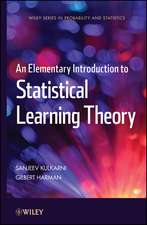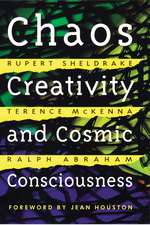Conceptions of the Human Mind: Essays in Honor of George A. Miller
Editat de Gilbert Harmanen Limba Engleză Paperback – 7 mai 2015
"What has happened to cognition? In other words, what has the past 30 years contributed to our understanding of the mind? Do we really know anything that wasn't already clear to William James?"
Each participant tried to stand back a little from his or her most recent work, but to address the general question from his or her particular standpoint. The chapters in the present volume derive from that occasion.
| Toate formatele și edițiile | Preț | Express |
|---|---|---|
| Paperback (1) | 487.37 lei 6-8 săpt. | |
| Taylor & Francis – 7 mai 2015 | 487.37 lei 6-8 săpt. | |
| Hardback (1) | 1006.60 lei 6-8 săpt. | |
| Taylor & Francis – aug 1993 | 1006.60 lei 6-8 săpt. |
Preț: 487.37 lei
Nou
Puncte Express: 731
Preț estimativ în valută:
93.30€ • 97.35$ • 78.21£
93.30€ • 97.35$ • 78.21£
Carte tipărită la comandă
Livrare economică 12-26 martie
Preluare comenzi: 021 569.72.76
Specificații
ISBN-13: 9781138876347
ISBN-10: 1138876348
Pagini: 292
Dimensiuni: 152 x 229 x 20 mm
Greutate: 0.41 kg
Ediția:1
Editura: Taylor & Francis
Colecția Psychology Press
Locul publicării:Oxford, United Kingdom
ISBN-10: 1138876348
Pagini: 292
Dimensiuni: 152 x 229 x 20 mm
Greutate: 0.41 kg
Ediția:1
Editura: Taylor & Francis
Colecția Psychology Press
Locul publicării:Oxford, United Kingdom
Public țintă
ProfessionalCuprins
Contents: Preface. T. Bever, Toast for G.A. Miller. M.S. Gazzaniga, The Implication of Specialized Neuronal Circuits Versus Neuronal Number for Concepts Concerning the Nature of Human Conscious Experience. W. Hirst, On the Nature of Systems? J.F. Lehman, A. Newell, T. Polk, R.L. Lewis, The Role of Language in Cognition: A Computational Inquiry. S. Pinker, The Central Problem for the Psycholinguist. E.E. Jones, The Social in Cognition. R.E. Nisbett, Rules, Reasoning, and Choice Behavior. G. Harman, Can Science Understand the Mind? J. Bruner, Explaining and Interpreting: Two Ways of Using Mind. S. Carey, Speaking of Objects, as Such. W.R. Garner, How Mind Works, if There Is One. P.N. Johnson-Laird, How the Mind Thinks. R.N. Shepard, On the Physical Basis, Linguistic Representation, and Conscious Experience of Colors. M. Cole, Remembering the Future.
Recenzii
"...this collection will provide interested neural networkers with a broader context. It is this kind of reading material that leads to inspiration sitting under an apple tree on a warm summer day."
—AI Expert
"...succeeds in showing the unavailability of an easy answer, be it mind is a mirror, mind is a flesh-and-blood computer or 'mind' is an empty word. It shows us that neither representationalism, nor behaviourism, nor neuroscience, nor hermeneutics can be the theory of mind, because nothing can be the theory of mind. Nevertheless, it shows us that each of these approaches can provide a theory of mind, a theory capable of elucidating some aspects of mind's nature and of its working. Taken together, they can help us see what mind is and how it works. This is what makes the volume reviewed here interesting for anyone who is fascinated by the phenomenon of mind."
—Language
All of us in cognitive psychology are in George Miller's debt. Conceptions of the Human Mind reminds us, particularly in the chapters from those who have known Miller for a long time, just how much in his debt we are. Much of behaviorist psychology, particularly as applied to 'higher' mental functioning, was a castle in the air. But it was a castle that few dared to attack, and we needed crusaders to lead us into the fray. George Miller has pride of place among them.
—The British Psychological Society
—AI Expert
"...succeeds in showing the unavailability of an easy answer, be it mind is a mirror, mind is a flesh-and-blood computer or 'mind' is an empty word. It shows us that neither representationalism, nor behaviourism, nor neuroscience, nor hermeneutics can be the theory of mind, because nothing can be the theory of mind. Nevertheless, it shows us that each of these approaches can provide a theory of mind, a theory capable of elucidating some aspects of mind's nature and of its working. Taken together, they can help us see what mind is and how it works. This is what makes the volume reviewed here interesting for anyone who is fascinated by the phenomenon of mind."
—Language
All of us in cognitive psychology are in George Miller's debt. Conceptions of the Human Mind reminds us, particularly in the chapters from those who have known Miller for a long time, just how much in his debt we are. Much of behaviorist psychology, particularly as applied to 'higher' mental functioning, was a castle in the air. But it was a castle that few dared to attack, and we needed crusaders to lead us into the fray. George Miller has pride of place among them.
—The British Psychological Society















